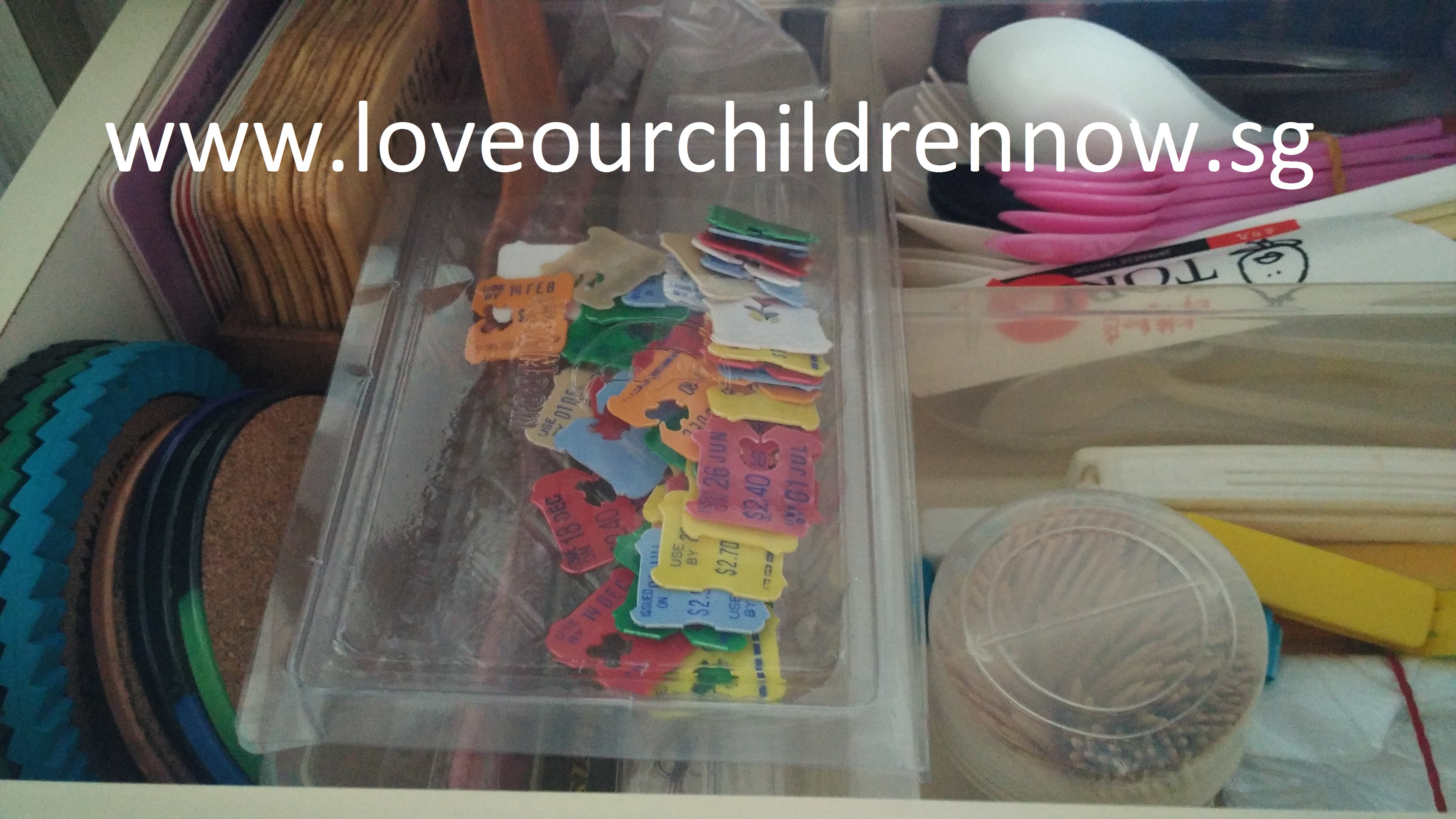A House That Cleans Itself
Recently I came across the best Housekeeping book I have ever read – The House That Cleans Itself (HTCI) by Mindy Starns Clark. Mindy wrote it for the “housekeeping impaired”, as she calls herself. I have never realised that I was considered housekeeping impaired till I read the book. I found the book only near the tail end of my house-packing journey of two years, yet it still helped me tremendously.
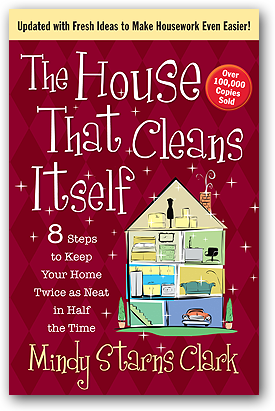
This is the second edition.
I got the first edition from the library.
After reading that, I ordered the second edition (because it is a book which is worth my shelf space!) and re-read it.
She mentioned that housekeeping was often a very emotional issue for many. We feel ashamed about our inability to keep our house neat. It feels like a major character flaw – as if we were lazy and disinterested. I can totally identify with that. I tried so hard but felt so stupid and lousy for so long.
Instead “Housekeeping is a talent and I just don’t have the talent, the same way some people are tone-deaf and can’t sing. It is not my fault.” (Paraphrasing Mindy – Page 21-23).
Like Mindy, I learned, through my two years journey, that housekeeping is a skill, and it can be acquired. As a therapist, I believe strongly in the re-wiring of the brain, and I saw my brain being re-wired through my work at keeping the house.
Now let me share some things about housekeeping that I learnt both through the book and my personal journey.
1) We want a house that is free of unnecessary clutter because we do not want to spend time on things – maintaining them or looking for them
Things are just things – whether we are keeping them because we paid a lot of money for it or bought it because it was a good deal, whether we think we may need it one day or we are keeping it for sentimental reasons. Every piece of item takes up our time. Is the item worth my time? If not, I should get rid of it, because I do not want to spend my time on things. (Page 80-81).
This revelation helped me tremendously at the tail end of my house-packing journey. By then, I had already gotten rid of things that people would logically dispose of, like clothes that all the children have outgrown and items which are beyond repair. However, there were still things which I was keeping because they were gifts which I don’t have a use for but I could never bear to discard (Japanese cutlery set), things which we used to use which I think we may use again (Roller blades) and things which had sentimental value (A big floor dog).
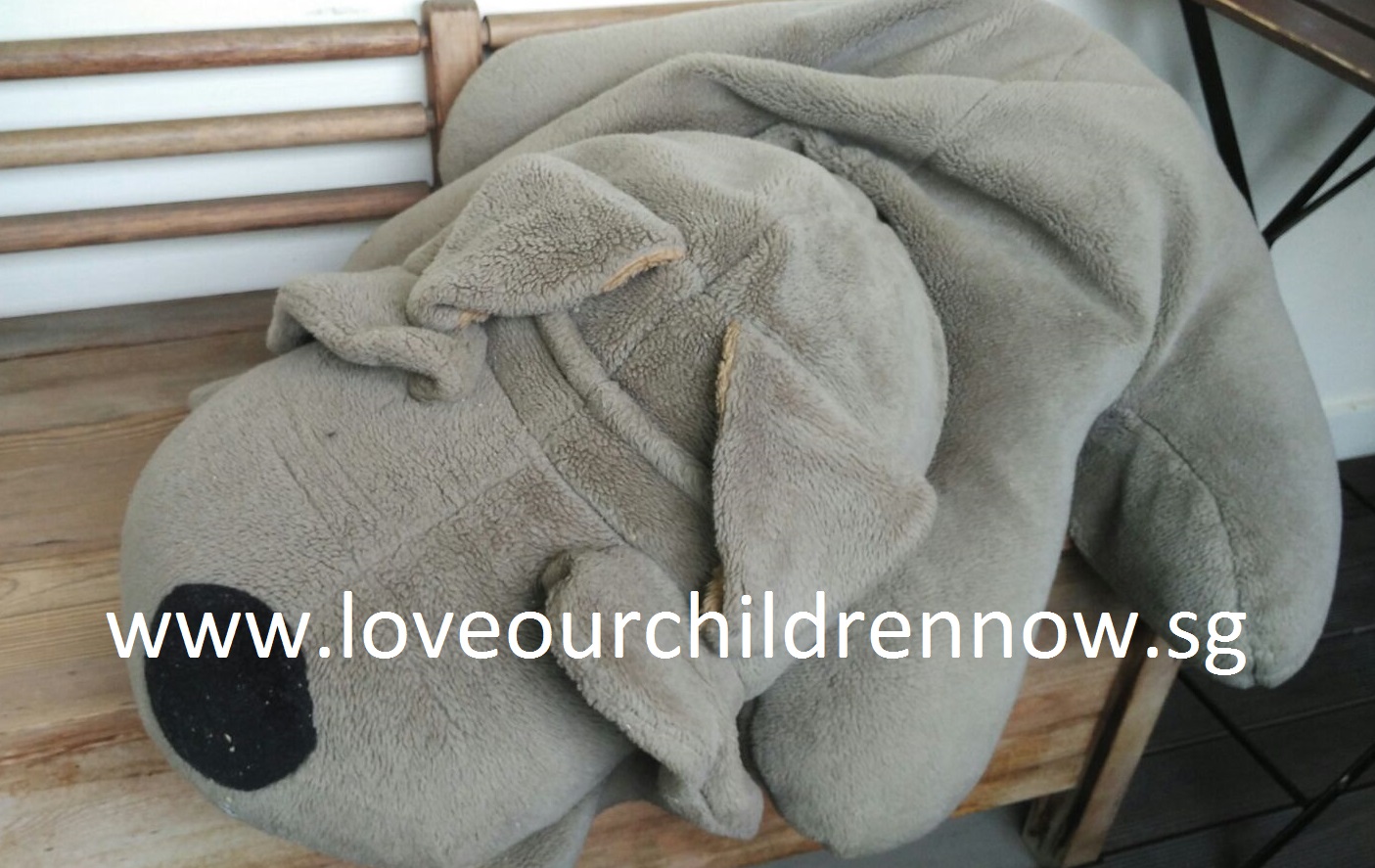
This was a gift which Edmund got for me when we were dating.
Obviously it has great sentimental value.
However, it is just a thing (I know, it sounds cruel! But it’s true!)
And people are more important.
Each one of these items costs me my time and emotional energy. Each time I look at the Japanese cutlery set, this would be a typical thought process “I never used it.. perhaps one day I should try to use it, but I don’t cook Japanese food, although actually we do like Japanese food – why don’t I learn to cook it, but I don’t think it is something I can do well in, the kids will probably not want to eat what I cook… anyway, I don’t cook often enough, I should cook more often… and I wonder how’s Jane (the person who bought me that gift). I should have kept in touch with her, I wonder whether Emma knows how Jane is doing, but anyway, I am not that much in touch with Emma either… ok, so what shall I do with this? It’s too good to throw away, anyway there’s space here, let’s just keep it first… I really should work harder at de-cluttering the house…” There is stress and guilt that came with the item – about my cooking, about my friendships and about the state of my home.
Each time I look at the Roller blades, similar thoughts run through my mind – stress and guilt about exercising, spending time with the children and the state of my home. Each time I look at the big floor dog I would think about the amount of dust it accumulates and how we don’t do anything but step on it when we sit on the arm chair which it sits under.
I decided that all these items are not worth the time, stress and guilt which come with them each time I see them. So I got rid of all of them and many other similar items.
I donated most of my items to MINDS, which upcycles the items for sale at its thrift shop.
2) Have a logical place for everything
I am incorporating two principles under this section.
Firstly, the old housekeeping advice – A place for everything – is a fundamental principle which all good housekeeper must adhere to. Every item must have a home – whether it is a button, a paper clip, newspapers, hobby stuff, incoming/outgoing mail, etc.

I created a book-basket.
So instead of having books lying on every table and chair,
they are in this basket.
Actually, the children still leave their books on unauthorised places,
but it is now easy for us to clear those books
– we just drop them into this basket.
We clear the basket once every few weeks
and that would be when we would slot them back onto the book shelves.
Secondly, the place for keeping things must fit the users’ behaviour. This is in fact the cornerstone of the HTCI system – Change the house to fit the behaviour. For example, if your family members prefer to just “drop” things into receptacle instead of hanging keys up on hooks or slotting books neatly onto a shelf, then you need to provide them a basket (the above photo-example) instead of trying to change their behaviour.
For example, I tried to provide hooks for us to hang our door keys (because that was how my mum did it) but it did not work for us. Everyone just placed their housekeys on the table. So I recycled a little flower basket and placed it next to the door. The basket has now also become a permanent home for a few other items (although I am strict about what can go there, because otherwise it will get cluttered).
Mindy had many epiphanies and one of them was “I had set up my entire home in a way that discouraged cleanliness and encouraged disaster and chaos” (Page 25).
My situation was no longer as dire by the time I read her book, but something clicked in my head after I read it and I made a little change, with regards to where I keep bread tabs.
I keep bread tabs to do activities with my kindergarten students. I used to put them in a little box together with all my teaching materials. All my teaching materials are in the study, on shelves which I cover with a piece of cloth to keep the dust out.
So each time I get a bread tab (when we have finished up the loaf of bread), the bread tab will sit on the breakfast counter till I have the time and am in the mood to put it into the box. Putting the tab into the box would require me to walk to the study, put up the cloth, locate the box and put the tab in, and put the cloth back down. No, it does not take up a lot of time, but it does take up time and energy and the placement of it definitely does not encourage me to do it. Needless to say, the bread tab will sit on the counter for a few days.
After my own epiphany, I moved the tab box into a kitchen drawer, just below the kitchen counter. Immediately after the bread tab is available, it is placed in the box – it takes only two seconds – and it is almost effortless. And the kitchen counter stays clean.
3) Ease the workflow
Here are some other things I did to help free my time and mental energy.
Labelling – You may not notice it, but having to simply retrieve names of objects from our brains takes time and mental energy (no matter how little), not to mention trying to recall where the items have been kept. This step can be made much easier with labelling. Labelling does not just save you time/energy when trying to locate items, other family members no longer need to ask you where everything is. They can even help you put things back.

The labelling doesn’t need to look beautiful
if you are using it for functional purposes.
Do whatever works for you.
Stations – Mindy defined stations as “a collection of items you store together because they will be used together” (page 73-75; Chapter 13 – Sample stations). I don’t use the concept of stations much, because most of my items are logically placed, e.g. the information/things I need for paying my bills are at my study area.
I do have a mini station for cleaning Roomba – my robot cleaner. We clear the Roomba dust-bin onto old newspapers, which we keep in a basket near the door. It used to be that each time I needed to clear the bin, I would go to the newspapers pile and pull out a page, put the rest of the newspapers back into the pile and go to Roomba. After reading the book, I realised I could simply prepare pieces of newspapers in advance (usually when I have pockets of time and am multi-tasking, e.g. chatting with my family) and place them together with the brush which I use for cleaning Roomba. This step of preparing newspapers for cleaning used to take me about 23 seconds each time I clear Roomba. Now it takes me only 3 seconds and no extra effort.
Another sort-of station we created was for the children’s wallet and phone.
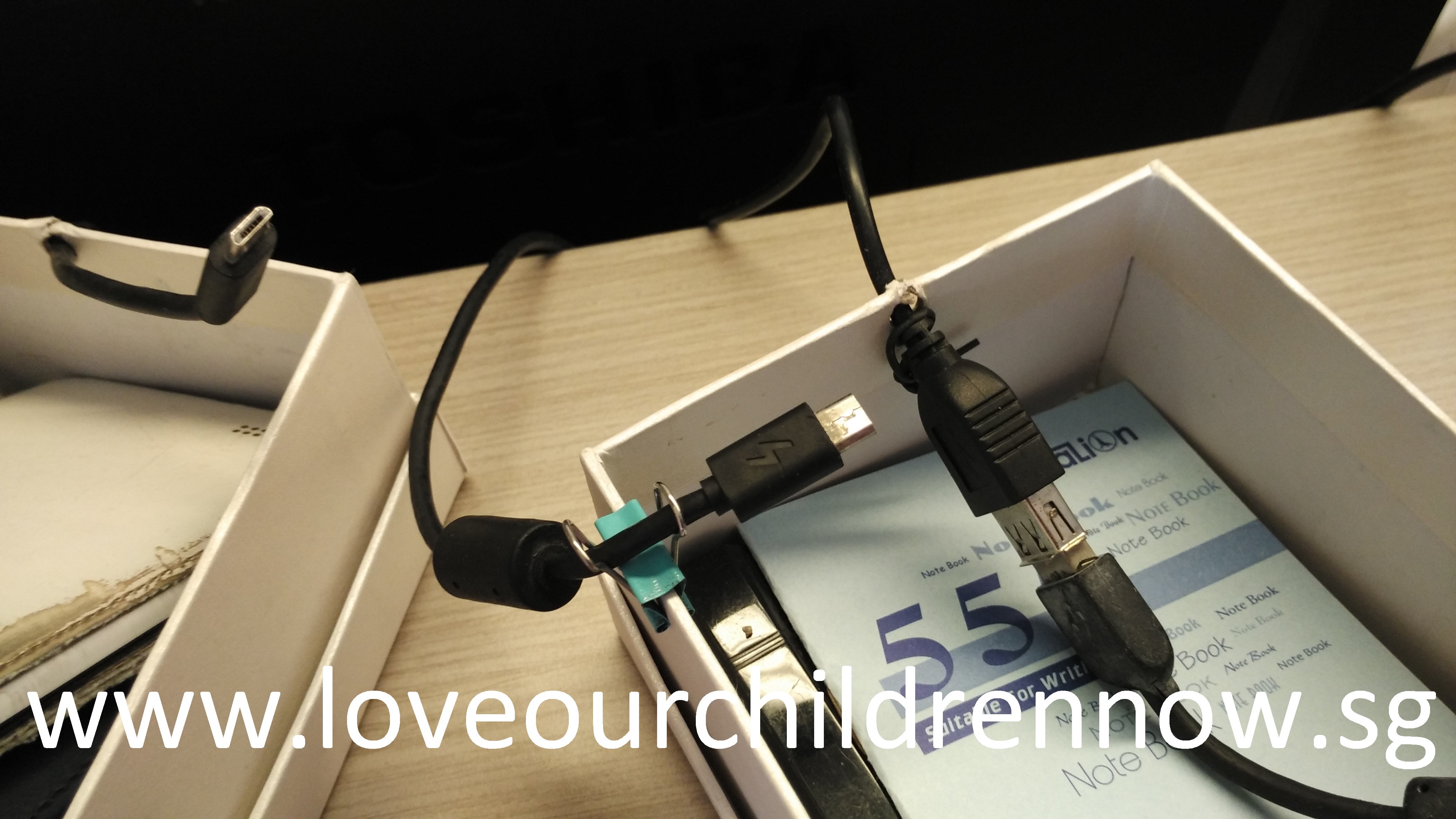
I was just tired of the children’s stuff lying around
and upcycled some boxes to place them in.
Elias improved upon his box to make it easier for charging.
Keeping things off the floor – Mindy talks about the “Up and away” principle that Hotels employ: “where many items are mounted on the wall… (because) the fewer items that have to be moved out of the way at cleaning time, the easier and faster it is to wipe and dust”. For me, one thing which I have to do is to keep as many items off the floor as possible. This is because of Roomba – my robot cleaner.
One constant irritation I have is with the electrical wires from power plugs. There is a particular one which is just behind a guitar stand, both of which I have to shift before running Roomba. I thought to myself – surely there must be a solution to this wire-situation, but I could not think of any.
So I sought my husband’s help on that (he is the more creative one between the two of us). My belief in him was well-placed. He helped me “hang” up the power cable onto an “S” hook placed on a nearby book stand. It was a simple solution but it saves me at least 6 seconds each time (at times the wire gets hooked to the guitar stand so it takes longer), not to mention the frustration that comes with it (“Why is this wire here? What’s the guitar doing here anyway…”). Now each time I shift the guitar stand, I marvel at the creativity of my husband and the joy of doing housework with such ease.
(You might think that it is more trouble using Roomba than not. Not at all. I love my robot cleaner. It saves so much of my time, even including the time I need to move some things off the ground and clear the bin. Over the years of using Roomba, we have become disciplined at keeping the floor clear. This not only makes it easier for us to mop the floor, it gives the house an overall cleaner look).
4) Not managing (things) is wasting (things)
I have come up with my own mantra – NMIW. While we don’t want to waste time on things, there are many things which help us with our lives, not to mention the fact that every thing costs money, so we need to learn to manage things well.
Out of sight, out of mind; Less is More – I had many containers in the kitchen – 70% of which I have never used. That was because firstly, I don’t need so many in the first place. Secondly, many were hidden behind other containers. I decided to clear 50% of the containers, ensuring that all the containers I kept are in clear view.
For rarely used items, e.g. steamboat cooker or large salad bowls for parties, I keep them higher up in the kitchen cabinet. To ensure I don’t forget their existence, I list every item, print the list out and paste it at the cabinet door.
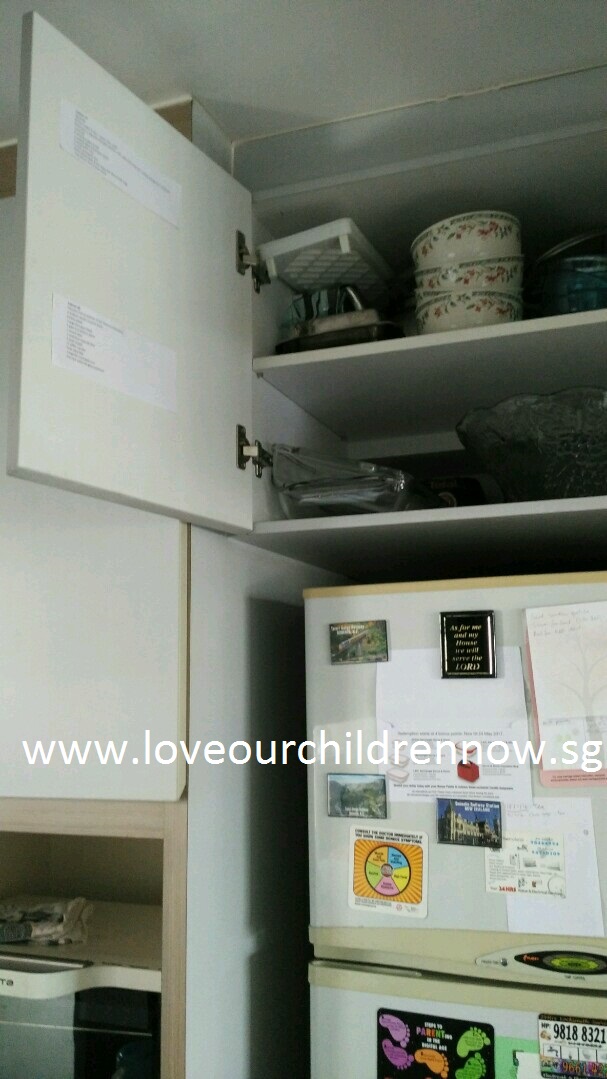
This is a tedious process – organising and itemising each item.
There is no short-cut to this.
But you only need to do it once, and it is worth it.
If you have it, use it
We have many note books, collected through conferences, goody bags and charity events. I decided to use them (duh…). Now I have one notebook for my prayers, another for my reflections, another for my daily planning, one for each of the small groups I am leading, one for my self-development journey, etc. I am also learning to write my To-do list in a notebook instead of pieces of paper. (You might think I am creating more work for myself. It might be so for someone else but not for me, because I am a writer/reader who loves books, including notebooks, so managing notebooks is something I have fun doing, so yes, these are things which are worth my time because I derive tremendous pleasure from using them).
I have many clothes which I never wear because they are not among my favourites. I now hang my clothes a different way to force a change in my behaviour. Instead of hanging my clothes by colour or type, I now hang them in the order which I wear them. A blouse which is just out of the laundry goes right to the left of the wardrobe and I have to pick something to wear from the right side of the wardrobe. (Anything which is constantly not worn, is not worth my time to keep).
5) Involve your family members
Mindy suggested these two options “Involve them from the get-go or start the ball rolling on your own in a few small ways and wait until they start to sense the positive changes around them before you reveal what you’ve been doing.” (Page 101).
For me, I started doing things on my own first. That was simply because I did not read the book till near the end of my journey. I don’t know whether it would have worked better if I had involved them earlier. I suspect not. It takes a lot of self-control to not try to change other people’s behaviour but focus on changing the home. My family members have suffered (and are still suffering) many years of nagging and manipulation on my part and are not likely to take well to another of what they would probably think of as a manipulative project to get them to do what I want.
Anyway, my family members’ involvement came in an interesting way.
Being at the tail end of my house-packing journey, I had come to the limit of my creativity in changing the house. Now what I needed was the occupants to change their behaviour, or so I thought.
As a family, we have weekly time for family devotion (We call it the Family Altar Time (FAT) during which we worship God through songs, study the bible and pray for each other) and we recently added on a Family Council (FC) during which we discuss family issues (e.g. the children’s privileges, housework routines, treats they would like to have, etc). I decided to make it fun and do a powerpoint presentation during one of the FC.
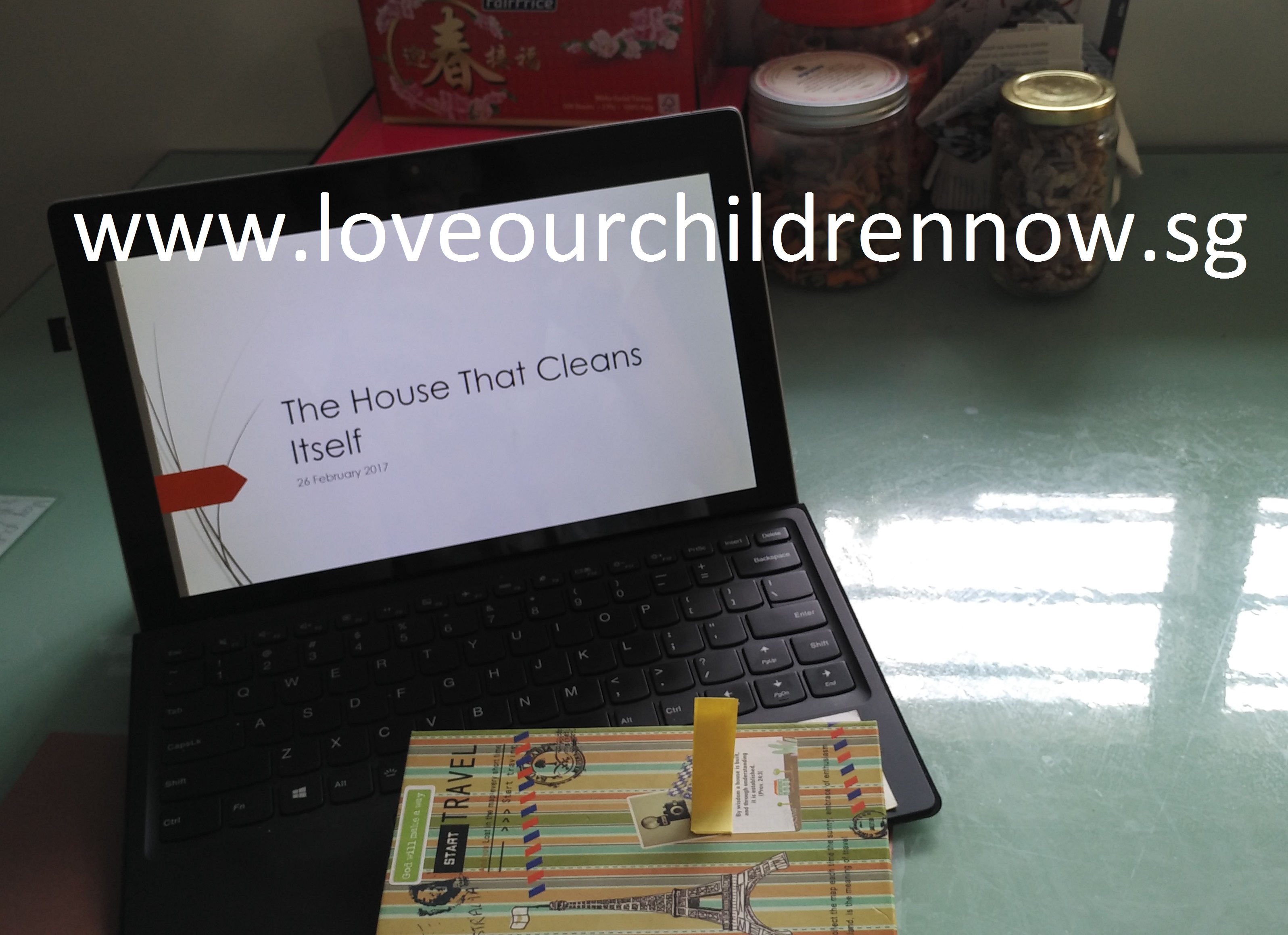
This is where we have our FAT and FC.
It is a casual meeting, so we snack sometimes.
That’s a notebook which I use to take notes of meeting for the FC.
I started preparing the presentation slides with a “Spot the problem” focus with the intention of drawing their attention to their errant behaviour (“Bad children! Bad husband!”) but for some strange reason, it started becoming a “Remaining problem areas” focus with the intention of seeking their inputs on why it happens and how we can solve it.
The presentation went on perfectly, and my husband and children had very logical reasons for why they did what they did (“It was a temporary situation, it doesn’t happen anymore”, “The drawers were too full”, “My box is too small”, “The basket is difficult to get to”). We spent time brainstorming solutions and where there was no other solution besides a change in behaviour, they easily agreed to try harder.
I also took the opportunity to highlight (with photos) the 4 packs of A4 laminating paper and more than twenty clear slip-in plastic files we now have because we had not learnt to manage things. (Note : This works well for males. They are usually more visual, are logical and understand financial costs. Saving money is a powerful motivation for them). It was also a good way for me to teach my children about housekeeping so they are more equipped in future.
Housekeeping, which is often a highly emotional issue in families, can be tackled simply as a logical problem. Mindy wrote about it and I saw it happen in my family. (In Chapter 19 – Of Marriage and Mess, Mindy gave specific step-by-step suggestions on tackling two most common issues – the placement of stuff and excessive accumulation of certain kinds of stuff).
If your family members (especially husbands) are as good as mine in problem solving, you will want to involve them. Besides the S hook wire and phone charging station, there were some other innovations by my brilliant husband.
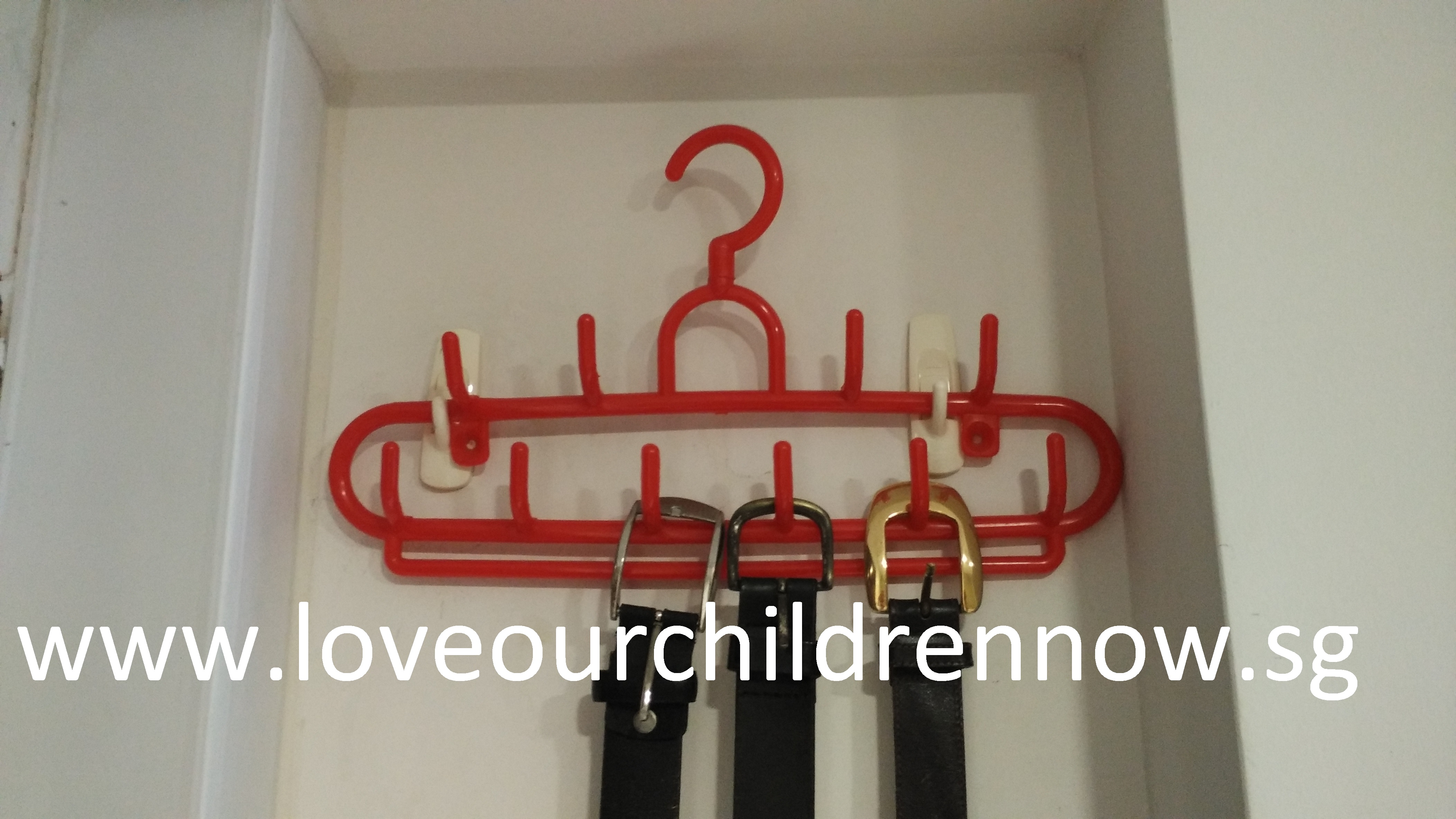
The two hooks have now become 10 hooks.
The best thing was that this was not a hanger which we newly bought.
It was something we had at home – for hanging belts I suppose –
and he used it for our clothes.
I love it.
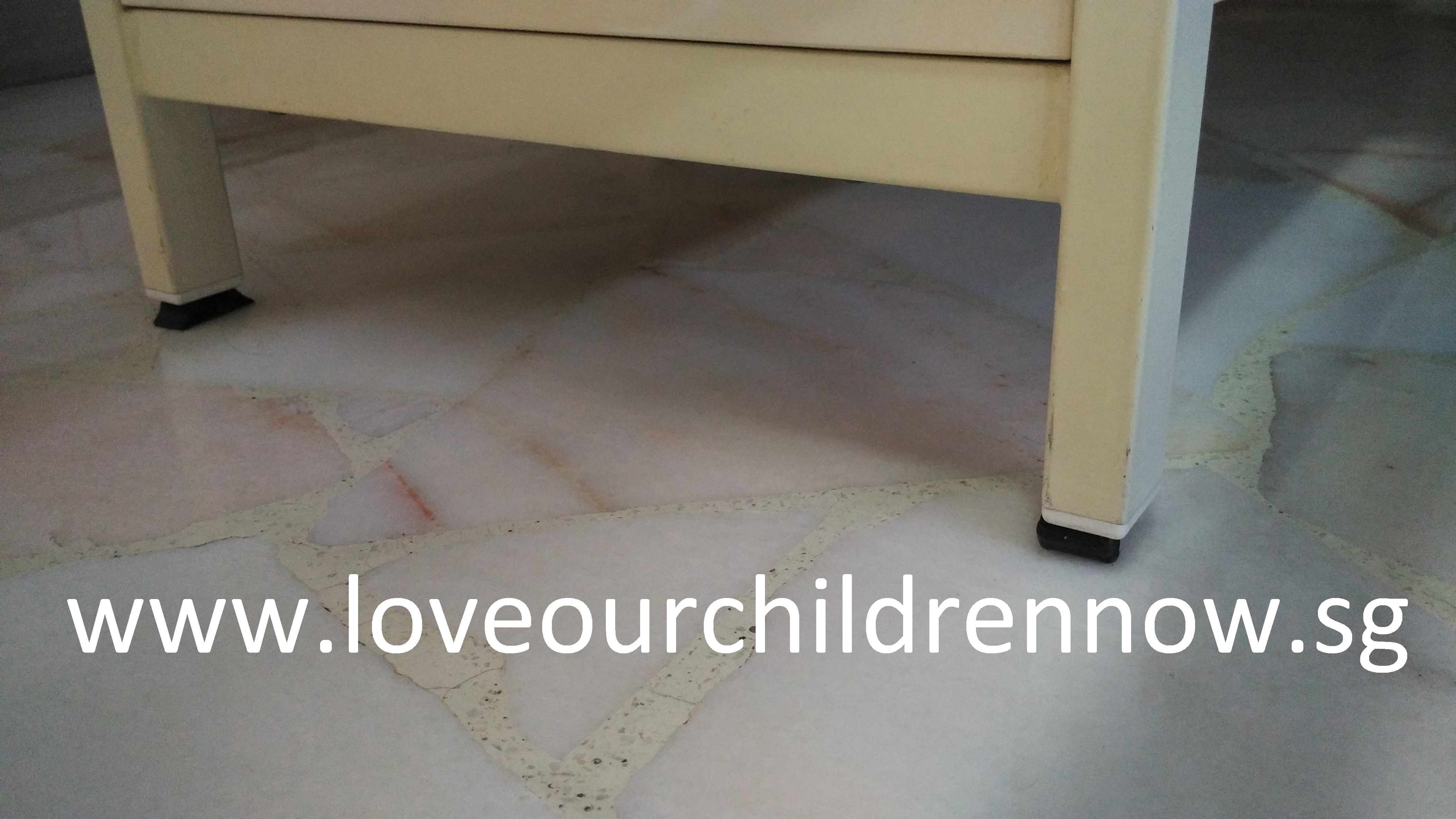
This is another Roomba (robot cleaner) innovation.
Roomba would get stuck below this shelf.
Edmund simply raised the legs by inserting these rubber legs.
It worked like a charm.
My husband is a genius.
Some Important things to note
Protect yourself against discouragement!!!
While I know that Mindy’s book and my experience may give you some hope as to what you can do for your own home, I am also aware that some of you might also feel discouraged by it. I can say this because that would have been an emotion I had to fight against, two years ago.
For me, when I first started working on the home, I had to manage my emotions very closely. I simply worked from one mini-project to another (Pantry, Medicine drawer, Vanity cupboard, Work table, etc) in a detached manner. It was very slow-going and I did not dare to keep track of my progress. I was afraid that if I did, I would be discouraged by how little I had accomplished and overwhelmed by how much more I had to do.
The reason I took so long was because I had to work on many other things in my life at the same time, which is a situation which you might be in too. The other reason was because I was really poor at it. For some areas, e.g. kitchen drawers, I actually had to do it a second round, a year later as it wasn’t done well the first round.
It was only after about a year that I looked back and became amazed at what I had accomplished. I thought that I was going to finish it within the next few months, but my progress became slower in the second year because I had done all the easier parts and the remaining problem areas needed better skills and some mental blocks to be removed. Mindy’s book helped me with those.
Be realistic and ready to work hard
Changing the house is not magic. It takes discipline and hard work. It does not happen overnight. We cannot be lazy and we must persevere. For some, the changing of your home might take a few months. In Mindy’s case, she took a year and in my case, it took 2 years.
Find your own motivation
Since it is not effortless and requires you to stay the course, you need motivation. For me, I did it mainly for myself. I really wanted it. It has always been my personal dream to have a beautiful home and after I became a homemaker, it became essential to my sanity and well-being. My husband and children have their office and school. I only have my home. It is where I work and rest. It was a big part of my identity. What am I to do? The years of nagging at my husband and children and griping about them to my girlfriends, have not brought any positive changes to my environment. There must be a better way and I think I found it.
I got what I wanted. A beautiful home (by my standard) and peace in the family (I no longer feel resentful towards my family for spoiling all my hard work, because the house takes care of itself).
If what I wanted is what you want, then let that motivation carry you through.
Don’t swing to the other extreme
Always remember the purpose behind the HTCI – it is so that we can focus on more important things in life like our family members and other relationships. So do not organise your home to such an extent that it becomes stressful for people to live in it or visit you.
Do not over-organise, nor be too insistent on certain things which may not matter. For example, my children’s study tables are constantly in a state of mess. It is one problem area which is difficult for me to solve because it requires their involvement. The reason they don’t do it is simply because they are not motivated to do it. They insist that they can find their things and it does not affect their work. I may think that I know better, but this is an issue of the heart – it cannot be won through argument or by imposing my authority. I have to let them grow into it, while training them about housekeeping through other areas of our home.
Some things do matter, e.g. we place the water dispenser on a small table. The drinking mugs/cups are placed opposite it and everyone places their cups there, except for one son. He insists on placing his drinking cup just next to the water dispenser, because he says it is more convenient. It matters to me because I cannot allow everyone to start following suit – the water dispenser table too small and the many cups on it will make it a safety issue. However, since I cannot convince him and there is no other way to solve it (I have brought it up to the FC and there was no solution), I have decided to become the person who consistently moves his cup to the cup tray each time I see it. It matters, but it is a small matter not worth fighting over.
In conclusion
I can testify that housekeeping is a lot more pleasurable for me now. I am working on a clear desk and when I look up from my computer and look at the rest of the study area or towards the living room, I see a house which is neat. It is not spotless and not every corner is straightened but everything is in its place. When I walk around the house I no longer experience the stress of seeing things I have to find a place for, or ridden with guilt for subjecting my husband and children to a messy living environment. The nagging thought – “I should pack up the house” has all but disappeared from my consciousness, because my house is packed.
I would never become as good as some of my friends in organising their space. Some new household situations leave me perplexed, not knowing what to do. I have to ask someone. Sometimes I feel stupid because things that are so obvious to others (nobody taught them! They just naturally know what to do!) continue to elude me, but those moments have become less often. Just like many natural impairments, you can never be “cured” from them but you can learn to overcome them.
If you look at my pictures, you will see that they are not pictures of a perfect home – some housekeeping goddess would do a much better job. But the important thing is – it is good enough and it stays neat. It frees me to do more important things in life and yet be a responsible homemaker. For example, just over the weekend, we had to drop everything and drive up to Malaysia to support a friend. We had to leave the house in the hands of three boys whose focus was to have as much fun as possible while the parents are away. When we came back, the house was in quite a mess. But it took less than 10 minutes to return it back to its original condition, with the children’s help. There were no temper flares and no stress – just tasks to be performed.
Go, bring peace and order to your home. May God bless you as you take it on.
